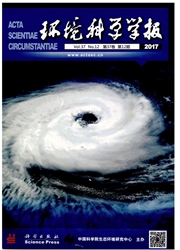

 中文摘要:
中文摘要:
非致死浓度下全氟辛烷磺酸(PFOS)对土壤生物的毒性作用研究在国内外鲜见报道.因此,本文采用人工土壤培养法,通过亚急性试验,研究了PFOS对赤子爱胜蚓(Eisenia fetida)生长抑制、谷胱甘肽硫转移酶(GST)、过氧化氢酶(CAT)及DNA损伤的影响.结果表明,PFOS暴露急性期和亚急性期,非致死浓度PFOS显著抑制蚯蚓生长(p=0.000),生长抑制率随着暴露浓度、暴露时间的增大而逐渐增大,42 d时250 mgkg-1处理组的生长抑制率最大(55.86%).PFOS暴露急性期和亚急性期,非致死浓度PFOS对GST和CAT活性没有显著性影响(GST:p=0.067;CAT:p=0.123),采用GST和CAT酶活性评价非致死浓度PFOS对蚯蚓的生态毒性时,需要参考其他指标进行综合分析.PFOS暴露急性期,非致死浓度PFOS可致体腔细胞DNA损伤;PFOS暴露亚急性期,体腔细胞DNA损伤随着暴露时间的增加而逐渐得到恢复.
 英文摘要:
英文摘要:
The toxicity effects of non-lethal perfluorooctane sulfonate (PFOS) on soil organisms were rarely reported. Artificial soil method was applied to study the effects of PFOS on growth inhibition, enzyme activities and DNA damages of earthworms (Eisenia fetida). The results showed that PFOS significantly inhibited the growth of earthworms during acute phase and sub-acute phase of PFOS exposure (p=0.000). The growth inhibition rates increased with the increase of PFOS concentrations and exposure time, with the greatest growth inhibition rate of 55.86% for 250 mgkg-1 group on 42 d. There was no significant impact on GST and CAT activities (GST: p=0.067;CAT: p=0.123) in the eco-toxicity of PFOS on earthworms, which suggested that other indicators might be needed for comprehensive analysis. PFOS damaged coelomocyte DNA during acute phase of PFOS exposure. However, when followed up with sub-acute phase, the damaged DNA recovered gradually with the increase of exposure time.
 同期刊论文项目
同期刊论文项目
 同项目期刊论文
同项目期刊论文
 Combined effects of cadmium and fluoranthene on germination, growth and photosynthesis of soybean se
Combined effects of cadmium and fluoranthene on germination, growth and photosynthesis of soybean se Integrated technology selection for energy conservation and PAHs control in iron and steel industry:
Integrated technology selection for energy conservation and PAHs control in iron and steel industry: Polybrominated diphenyl ethers (PBDEs) in China: Policies and recommendations for sound management o
Polybrominated diphenyl ethers (PBDEs) in China: Policies and recommendations for sound management o HCHs and DDTs in Soils around Guanting Reservoir in Beijing, China: Spatial-temporal Variation and C
HCHs and DDTs in Soils around Guanting Reservoir in Beijing, China: Spatial-temporal Variation and C Perfluorinated compounds in water and sediment from coastal regions of the northern Bohai Sea, China
Perfluorinated compounds in water and sediment from coastal regions of the northern Bohai Sea, China Ecological Risk Assessment of Arsenic and Metals in Surface Sediments from Estuarine and Coastal Are
Ecological Risk Assessment of Arsenic and Metals in Surface Sediments from Estuarine and Coastal Are From lagging to leading? Technological innovation systems in emerging economies and the case of Chin
From lagging to leading? Technological innovation systems in emerging economies and the case of Chin Perfluorinated compounds in surface waters from Northern China: Comparison to level of industrializa
Perfluorinated compounds in surface waters from Northern China: Comparison to level of industrializa Factors influencing the contents of metals and As in soils around the watershed of Guanting Reservoi
Factors influencing the contents of metals and As in soils around the watershed of Guanting Reservoi 期刊信息
期刊信息
